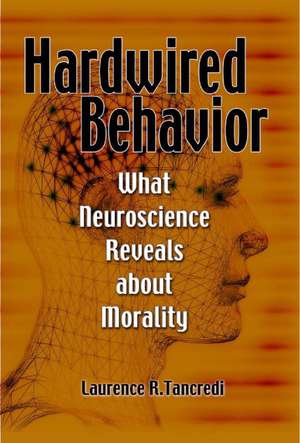Hardwired Behavior: What Neuroscience Reveals about Morality
Autor Laurence Tancredien Limba Engleză Hardback – 18 sep 2005
Preț: 276.32 lei
Nou
Puncte Express: 414
Preț estimativ în valută:
52.88€ • 55.00$ • 43.66£
52.88€ • 55.00$ • 43.66£
Carte tipărită la comandă
Livrare economică 14-28 aprilie
Preluare comenzi: 021 569.72.76
Specificații
ISBN-13: 9780521860017
ISBN-10: 0521860016
Pagini: 240
Dimensiuni: 158 x 237 x 23 mm
Greutate: 0.48 kg
Editura: Cambridge University Press
Colecția Cambridge University Press
Locul publicării:New York, United States
ISBN-10: 0521860016
Pagini: 240
Dimensiuni: 158 x 237 x 23 mm
Greutate: 0.48 kg
Editura: Cambridge University Press
Colecția Cambridge University Press
Locul publicării:New York, United States
Cuprins
Acknowledgements; Preface; 1. Neuroscience and morality; 2. Morality and the mind; 3. Beyond the mind zone; 4. Morality and the brain; 5. Bad without conscience; 6. Biology of choice; 7. Sex and the single moral code; 8. Brain biology and sex; 9. Deception; 10. The biology of money; 11. The bad and the mad; 12. Creating a moral brain; Glossary; Notes; Index.
Recenzii
'No one writes as well about these topics as Laurence Tancredi - he is versed in history, philosophy and legal thought with a sophisticated background and understanding of the neurosciences. In this book Dr Tancredi expertly guides the reader through the complex issues of free will and morality and what new insights are gained through discoveries in the science of the brain.' Myrna Weissman, Professor of Epidemiology and Psychiatry, College of Physician and Surgeons, Columbia University
'I've read Dr Tancredi's manuscript carefully and found it fascinating. Dr Tancredi's provocative and challenging thesis is explored lucidly and systematically. He weaves together clinical cases, research findings, and theory into a provocative and wholly original consideration of the entire notion of free-will and the biological bases of moral behavior. He explains how brain structure and function influence the processing and content of our thoughts and the actions that result, creating a highly original and readable synthesis. Dr Tancredi is able to present complex and wide-ranging material in an accessible and comprehensible fashion, making for a truly fascinating tale.' Arthur J. Barsky, Professor of Psychiatry, Harvard Medical School, Director of Psyhiatric Research, Brigham Women's Hospital
'Joining together the forensic skills of a lawyer and a psychiatrist, Tancredi probes the neurological foundations of moral thought in this fascinating new work. If we are indeed 'hardwired' for morality, then we may someday have the power to rehabilitate even those who today seem to stand completely outside the pales of our moral community, such as the serial killer on death row whom Tancredi interviewed for the book. In a speculative and provocative last chapter, he shows that lawyers can imagine the future through 'law fiction,' just as scientists have done for so long through better established genre of science fiction.' Sheila Jasanoff, Pforzheimer Professor of Science and Techonology Studies, John F. Kennedy School of Government, Harvard
'… a genuine contribution to increasing public understanding of neuroscience and moral behavior … In addition to providing content that is easy to read, the author makes his commitment to communication evident in early chapters of the book with simple illustrations of relevant neuroanatomy … a straightforward glossary of terms, and a lengthy but excellent notes section … the close alignment of neuroscientific findings about hardwired behavior with ethical and intelligent thinking that respects and honors personal and cultural values is vital. The concept of close alignment is one with which this reviewer agrees wholeheartedly and one that should be embraced by all neuroscientists.' Nature Neuroscience
'The book's strength lies in its accessibility: the author clearly describes neural systems that contribute to moral behavior, and then relates those systems to illustrative clinical cases. The writing style and topics are at exactly the right level to excite and fascinate undergraduates, especially those from a non-neuroscience background. Highly recommended.' Choice
'I've read Dr Tancredi's manuscript carefully and found it fascinating. Dr Tancredi's provocative and challenging thesis is explored lucidly and systematically. He weaves together clinical cases, research findings, and theory into a provocative and wholly original consideration of the entire notion of free-will and the biological bases of moral behavior. He explains how brain structure and function influence the processing and content of our thoughts and the actions that result, creating a highly original and readable synthesis. Dr Tancredi is able to present complex and wide-ranging material in an accessible and comprehensible fashion, making for a truly fascinating tale.' Arthur J. Barsky, Professor of Psychiatry, Harvard Medical School, Director of Psyhiatric Research, Brigham Women's Hospital
'Joining together the forensic skills of a lawyer and a psychiatrist, Tancredi probes the neurological foundations of moral thought in this fascinating new work. If we are indeed 'hardwired' for morality, then we may someday have the power to rehabilitate even those who today seem to stand completely outside the pales of our moral community, such as the serial killer on death row whom Tancredi interviewed for the book. In a speculative and provocative last chapter, he shows that lawyers can imagine the future through 'law fiction,' just as scientists have done for so long through better established genre of science fiction.' Sheila Jasanoff, Pforzheimer Professor of Science and Techonology Studies, John F. Kennedy School of Government, Harvard
'… a genuine contribution to increasing public understanding of neuroscience and moral behavior … In addition to providing content that is easy to read, the author makes his commitment to communication evident in early chapters of the book with simple illustrations of relevant neuroanatomy … a straightforward glossary of terms, and a lengthy but excellent notes section … the close alignment of neuroscientific findings about hardwired behavior with ethical and intelligent thinking that respects and honors personal and cultural values is vital. The concept of close alignment is one with which this reviewer agrees wholeheartedly and one that should be embraced by all neuroscientists.' Nature Neuroscience
'The book's strength lies in its accessibility: the author clearly describes neural systems that contribute to moral behavior, and then relates those systems to illustrative clinical cases. The writing style and topics are at exactly the right level to excite and fascinate undergraduates, especially those from a non-neuroscience background. Highly recommended.' Choice
Notă biografică
Descriere
This book explores the impact of neuroscience research over the past 20 or more years on brain function as it affects moral decisions.















